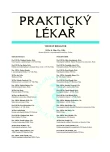-
Medical journals
- Career
Prevention of tick-borne encephalitis from the point of view of a health insurance company
Authors: H. Dolanský
Authors‘ workplace: Vedoucí odboru kontroly zdravotní péče: MUDr. Hynek Dolanský, Ph. D. ; Hutnická zaměstnanecká pojišťovna
Published in: Prakt. Lék. 2009; 89(2): 78-81
Category: Of different specialties
Overview
This article outlines the importance of vaccination against tick–borne encephalitis, and the current situation in the Czech Republic. Through the media, health insurance companies are interested in increasing awareness of this form of prevention and of the possibility of reimbursement for vaccination. One of the Czech health insurance companies has been observing the progression of this disease over a period of time, focusing on the level of financial cover in relation to participation in the vaccination programme against tick-borne encephalitis and the age at risk who have not been vaccinated. It has been noticed that participation in vaccination is dependent upon age. The aim is to encourage and support vaccination, particularly in the elderly.
Key words:
tick-borne encephalitis virus, prevention, vaccination, public relations.
Sources
1. Klíšťová encefalitida [on-line]. Dostupné na www.klistova-encefalitida.cz.
2. Kříž, B., Beneš, Č. Extrémní vzestup incidence klíšťové encefalitidy v České republice v roce 2006. Praha: Zprávy CEM (SZÚ), 2007, 18(6), s. 269-274.
3. Daniel, M., Kriz, B., Danielova , V. et al. Occurrence of ticks infected by tick-borne encephalitis virus and Borrelia genspecies in mountains of the Czech Republic. Eurosurveillance 2005, 10(3), p. 1-3.
4. Výroční zpráva HZP. Ostrava, 1998, s. 28.
5. Dolanský, H., Bitomská, Š., Kosarz, Z. a kol. Prevence klíšťové encefalitidy „plus pro zdraví“ (přednáška). Slezské dny preventivní medicíny 7. 2. 2008, Lázně Karviná-Darkov.
Labels
General practitioner for children and adolescents General practitioner for adults
Article was published inGeneral Practitioner

2009 Issue 2-
All articles in this issue
- Post-traumatic stress disorder in abused children
- Smoking and cardiovascular diseases
- The role of reduction mammaplasty in breast hypertrophy
- Prevention of tick-borne encephalitis from the point of view of a health insurance company
- Hand transplantation
- Neurostimulation for the treatment of refractory angina pectoris
- Pathophysiology of diabetic retinopathy
- Allergic rhinitis as an occupational disease
- Patient satisfaction with provided care: theoretic approaches and models
- General Practitioner
- Journal archive
- Current issue
- Online only
- About the journal
Most read in this issue- Hand transplantation
- Post-traumatic stress disorder in abused children
- Allergic rhinitis as an occupational disease
- Patient satisfaction with provided care: theoretic approaches and models
Login#ADS_BOTTOM_SCRIPTS#Forgotten passwordEnter the email address that you registered with. We will send you instructions on how to set a new password.
- Career

